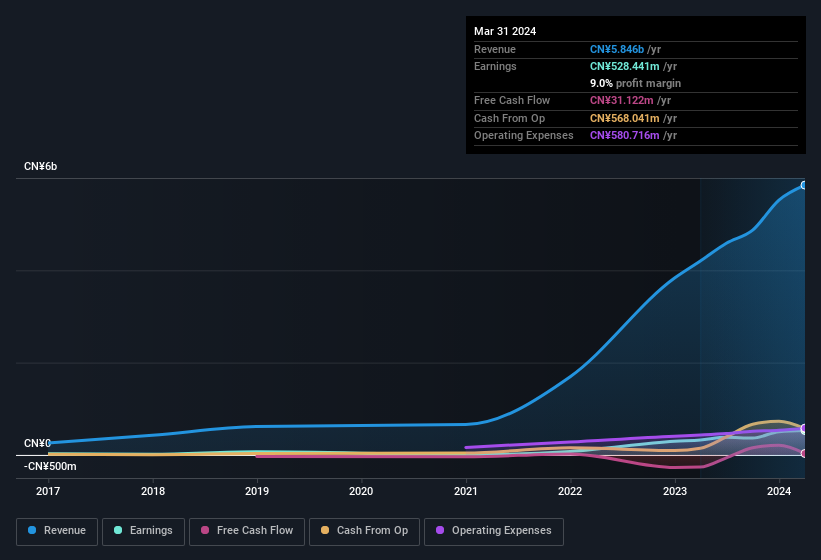- China
- /
- Auto Components
- /
- SHSE:688612
Shenzhen VMAX New Energy's (SHSE:688612) Promising Earnings May Rest On Soft Foundations
Shenzhen VMAX New Energy Co., Ltd. (SHSE:688612) just reported some strong earnings, and the market reacted accordingly with a healthy uplift in the share price. We did some analysis and think that investors are missing some details hidden beneath the profit numbers.
View our latest analysis for Shenzhen VMAX New Energy

A Closer Look At Shenzhen VMAX New Energy's Earnings
As finance nerds would already know, the accrual ratio from cashflow is a key measure for assessing how well a company's free cash flow (FCF) matches its profit. The accrual ratio subtracts the FCF from the profit for a given period, and divides the result by the average operating assets of the company over that time. You could think of the accrual ratio from cashflow as the 'non-FCF profit ratio'.
Therefore, it's actually considered a good thing when a company has a negative accrual ratio, but a bad thing if its accrual ratio is positive. That is not intended to imply we should worry about a positive accrual ratio, but it's worth noting where the accrual ratio is rather high. Notably, there is some academic evidence that suggests that a high accrual ratio is a bad sign for near-term profits, generally speaking.
For the year to March 2024, Shenzhen VMAX New Energy had an accrual ratio of 0.37. That means it didn't generate anywhere near enough free cash flow to match its profit. As a general rule, that bodes poorly for future profitability. To wit, it produced free cash flow of CN¥31m during the period, falling well short of its reported profit of CN¥528.4m. Given that Shenzhen VMAX New Energy had negative free cash flow in the prior corresponding period, the trailing twelve month resul of CN¥31m would seem to be a step in the right direction.
That might leave you wondering what analysts are forecasting in terms of future profitability. Luckily, you can click here to see an interactive graph depicting future profitability, based on their estimates.
Our Take On Shenzhen VMAX New Energy's Profit Performance
As we discussed above, we think Shenzhen VMAX New Energy's earnings were not supported by free cash flow, which might concern some investors. For this reason, we think that Shenzhen VMAX New Energy's statutory profits may be a bad guide to its underlying earnings power, and might give investors an overly positive impression of the company. But on the bright side, its earnings per share have grown at an extremely impressive rate over the last three years. The goal of this article has been to assess how well we can rely on the statutory earnings to reflect the company's potential, but there is plenty more to consider. So while earnings quality is important, it's equally important to consider the risks facing Shenzhen VMAX New Energy at this point in time. For example, we've found that Shenzhen VMAX New Energy has 2 warning signs (1 can't be ignored!) that deserve your attention before going any further with your analysis.
Today we've zoomed in on a single data point to better understand the nature of Shenzhen VMAX New Energy's profit. But there is always more to discover if you are capable of focussing your mind on minutiae. For example, many people consider a high return on equity as an indication of favorable business economics, while others like to 'follow the money' and search out stocks that insiders are buying. While it might take a little research on your behalf, you may find this free collection of companies boasting high return on equity, or this list of stocks that insiders are buying to be useful.
New: Manage All Your Stock Portfolios in One Place
We've created the ultimate portfolio companion for stock investors, and it's free.
• Connect an unlimited number of Portfolios and see your total in one currency
• Be alerted to new Warning Signs or Risks via email or mobile
• Track the Fair Value of your stocks
Have feedback on this article? Concerned about the content? Get in touch with us directly. Alternatively, email editorial-team (at) simplywallst.com.
This article by Simply Wall St is general in nature. We provide commentary based on historical data and analyst forecasts only using an unbiased methodology and our articles are not intended to be financial advice. It does not constitute a recommendation to buy or sell any stock, and does not take account of your objectives, or your financial situation. We aim to bring you long-term focused analysis driven by fundamental data. Note that our analysis may not factor in the latest price-sensitive company announcements or qualitative material. Simply Wall St has no position in any stocks mentioned.
About SHSE:688612
Shenzhen VMAX New Energy
Engages in the research, development, production, and sale and technical services of new energy vehicle power products in China and internationally.
Exceptional growth potential with flawless balance sheet.
Market Insights
Community Narratives



